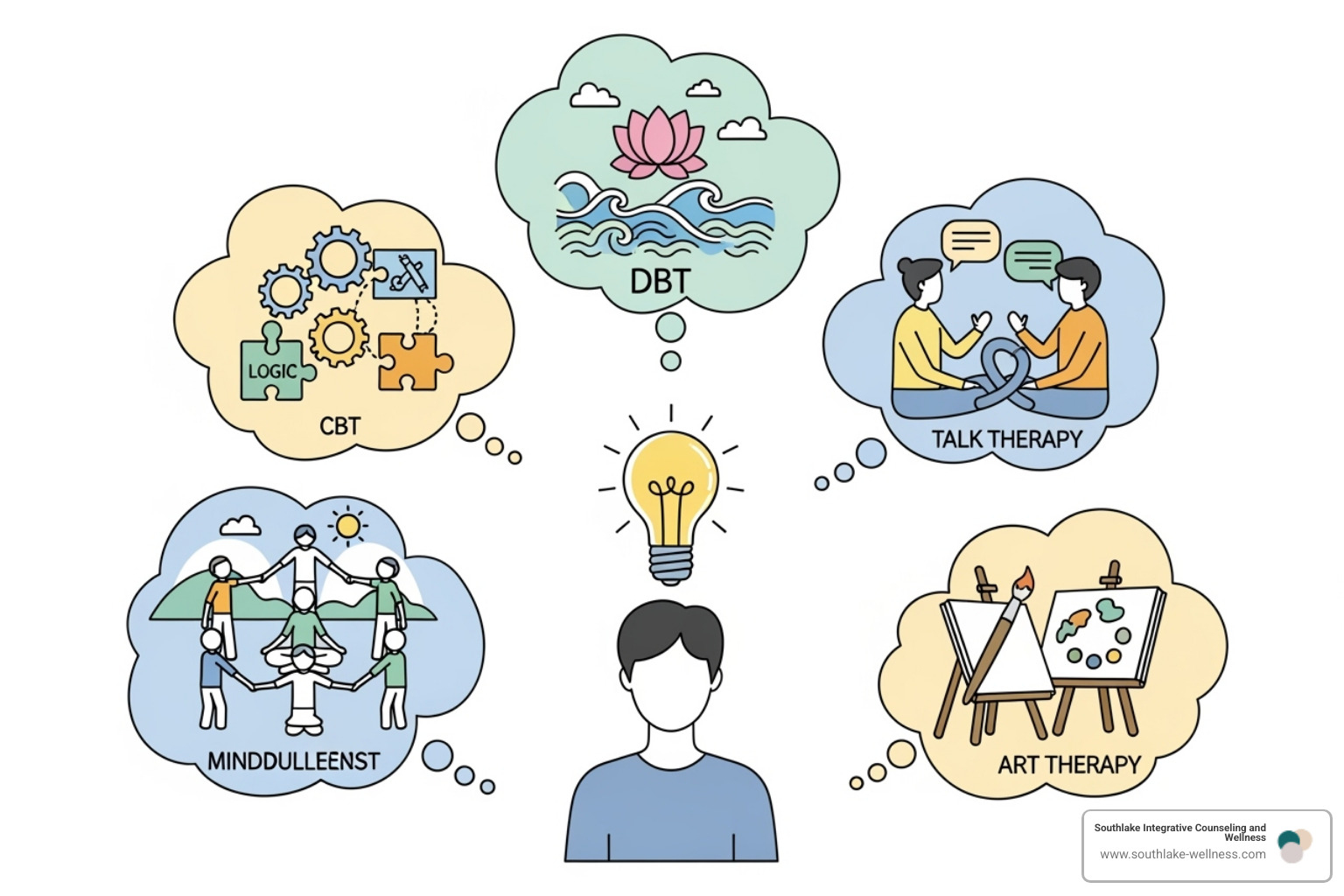
What Is Evidence-Based Therapy and Why Does It Matter?
Evidence based therapy is the gold standard in mental health care. It combines scientific research, clinical expertise, and your personal preferences to deliver the most effective treatment. However, the American Psychological Association reports a startling reality: only 20 percent of available mental health therapies are proven to work.
Key Components of Evidence-Based Therapy:
- Best Available Research - Treatments tested through rigorous scientific studies
- Clinical Expertise - Your therapist's professional judgment and experience
- Patient Values - Your personal preferences, culture, and treatment goals
- Collaborative Process - Shared decision-making between you and your therapist
- Measurable Outcomes - Clear goals and progress tracking
This approach ensures you receive safe, effective, and customized treatment. Many evidence-based treatments show symptom relief in about 12 sessions, making them both efficient and cost-effective.
The three-pillar model of evidence-based practice is like a three-legged stool—remove any leg, and the treatment becomes unstable. When therapists use unproven methods, patients may not get the relief they deserve.
Our experienced counselors specialize in evidence based therapy approaches like Cognitive Behavioral Therapy, Dialectical Behavior Therapy, and Acceptance & Commitment Therapy, customizing these proven methods to help you build skills for lasting change.

The Three Pillars of Evidence-Based Practice
Think of evidence based therapy as a sturdy three-legged stool. Each leg—the best available research, clinical expertise, and your values—is essential. If you remove any one of them, the whole thing becomes wobbly. That's how evidence-based practice works in mental health care.
When these three components work together, we create a truly collaborative process built on shared decision-making. We build your treatment plan with you, ensuring it fits your life, values, and unique circumstances.
This collaborative spirit is central to our work at Southlake Integrative Counseling and Wellness. It's why the importance of research-based treatments aligns with our holistic approach to depression, where we integrate proven methods to support your well-being.
The Role of Scientific Research
Scientific research is the foundation of effective therapy, taking the guesswork out of treatment. Just as you wouldn't build a house with untested materials, we don't approach your mental health without a reliable roadmap.
Randomized controlled trials are the gold standard in clinical research, comparing treatments to see what consistently helps. When multiple studies are combined in meta-analyses, we get an even clearer picture of what works.
This rigorous process identifies empirically supported treatments—therapies proven to help with specific mental health concerns. By measuring results for efficacy and safety, research allows us to offer treatments that have helped thousands of people facing similar challenges. You can explore our specific evidence-based therapy techniques to see this in action.
The Importance of Clinical Expertise
While research provides the roadmap, clinical expertise helps us steer the journey with you. This pillar represents our professional judgment and experience working with real people.
You're not a textbook case, and cookie-cutter approaches rarely work. Our clinical expertise allows us to individualize your treatment, adapting proven methods to fit your specific needs, especially when handling co-occurring conditions like anxiety and depression.
Adapting treatment requires both knowledge and intuition. It means adjusting the pace and focus to match where you are in your healing journey. Our team is committed to experience and staying current with the latest research through ongoing professional development.
You can learn more about our team's qualifications by visiting our page about therapists in Southlake, TX.
How Patient Values and Preferences Factor In
The third and perhaps most important leg of the stool is you. Your cultural background, personal goals, and treatment preferences all shape what effective therapy looks like.
We believe in empowering our clients, which means you have a genuine voice in your care. Your preferences—whether for a structured approach, mindfulness, or a focus on the mind-body connection—are essential ingredients in your healing. When treatment aligns with your values, you're more engaged and motivated.
Your cultural background influences how you understand emotions and healing, and we honor these perspectives to ensure therapy feels authentic. This creates a truly collaborative therapeutic process. Together, we set personal goals that are meaningful to you, making therapy not just effective, but respectful of who you are.
Explore our emotional wellness counseling options to experience this collaborative approach firsthand.
Key Benefits of Evidence-Based Therapy

Choosing evidence based therapy means investing in a rigorously tested approach that works. The benefits go beyond temporary relief, offering a path to lasting change that is both scientifically sound and personally meaningful.
The key advantages include safe and ethical care, faster symptom relief through targeted interventions, cost-effectiveness, broad applicability across many conditions, and truly custom care that honors your unique goals.
Why EBT is Effective and Efficient
Most evidence-based treatments are designed to be time-limited, with many people seeing significant improvement in about 12 sessions. This isn't about rushing treatment; it's about using proven, efficient strategies to help you feel better sooner.
This efficiency means less financial burden and disruption to your routine. Because these approaches are tested, they cut through the guesswork. We track measurable outcomes together to ensure we're making real progress.
The financial benefits are also significant. Effective mental health treatment can lead to reduced medical costs and increased productivity. Studies show high rates of improvement, and for employers, it means better employee retention and lower medical claim costs. These aren't just numbers; they represent people getting their lives back on track. For more details, you can explore this research on EBT effectiveness.
How EBT Empowers Patients
Evidence based therapy puts you in the driver's seat of your healing journey. This person-centered care makes your unique needs, values, and goals central to everything we do.
We take a goal-oriented approach, working as partners to create a clear roadmap for what you want to achieve. It's about finding what will work for your specific situation and lifestyle.
Your active client participation is what makes it work. You're not just talking; you're learning practical skills and applying them to your real life. This hands-on approach helps you build skills for life—tools you can use long after therapy ends to maintain your progress and handle future challenges with confidence.
This empowering process is at the heart of our work at Southlake Integrative Counseling and Wellness. Learn more about our customized, collaborative approach on our page about individual therapy in Southlake, TX.
Common Examples of Evidence-Based Therapies

I often compare choosing a therapy to choosing a restaurant. You could pick one randomly, or choose one with proven recipes and great reviews. Why leave your mental health to chance when proven treatments exist?
The world of evidence-based therapies is diverse. At Southlake Integrative Counseling and Wellness, we use the most effective approaches to help you achieve lasting change.
Common Evidence-Based Therapies:
- Cognitive Behavioral Therapy (CBT)
- Dialectical Behavior Therapy (DBT)
- Accelerated Resolution Therapy (ART)
- Interpersonal Therapy (IPT)
- Behavioral Activation (BA)
- Mindfulness-Based Cognitive Therapy (MBCT)
- Eye Movement Desensitization and Reprocessing (EMDR)
- Acceptance and Commitment Therapy (ACT)
- Cognitive Processing Therapy (CPT)
- Prolonged Exposure Therapy (PE)
- Motivational Interviewing (MI)
- Behavioral Family Therapy (BFT)
Cognitive Behavioral Therapy (CBT)
CBT is widely recognized as the gold standard of therapy due to decades of rigorous research. It works on a simple premise: our thoughts, feelings, and behaviors are connected. By learning to identify and change negative thinking patterns, we can feel better and act in healthier ways.
This approach is highly effective for treating anxiety and depression. Instead of just talking about problems, CBT gives you practical tools to tackle them head-on. The American Psychological Association recognizes CBT as the gold standard for many conditions, and we offer comprehensive Cognitive Behavioral Therapy services customized to your needs.
Dialectical Behavior Therapy (DBT)
DBT builds on CBT, adding skills for managing intense emotions. Originally developed for Borderline Personality Disorder, it's helpful for anyone who feels their emotions are overwhelming.
DBT teaches four essential skills: mindfulness, distress tolerance, emotional regulation, and interpersonal effectiveness. It uniquely balances acceptance and change, teaching you to accept your emotions while developing the skills to manage them. Research shows remarkable results for treating BPD and complex trauma.
Other Powerful EBT Approaches
The beauty of evidence based therapy is its variety. Different approaches work for different people and situations.
Accelerated Resolution Therapy (ART) helps you reprocess difficult experiences without having to relive them in detail. Using eye movements, ART can provide rapid relief from trauma symptoms. We've seen remarkable results with our Accelerated Resolution Therapy (ART) program.
Interpersonal Therapy (IPT) focuses on the connection between your relationships and your mood. It's a time-limited approach ideal for those whose depression or anxiety is tied to relationship struggles.
Behavioral Activation (BA) is a straightforward approach to depression. It helps you schedule meaningful activities that naturally boost your mood, creating a prescription for joy.
Mindfulness-Based Therapies teach you to observe your thoughts and feelings without getting swept away by them. Our Mindfulness-Based Group Therapy combines these powerful practices with the support of a community.
Finding Your Path: Accessing EBT and Navigating Challenges

Starting your mental health journey can be overwhelming. How do you find a therapist who practices evidence based therapy, and what challenges might you face? Think of it like choosing a specialist for a medical condition—you want someone with the right training and experience.
How to Find a Therapist Who Practices Evidence-Based Therapy
Finding a qualified EBT therapist isn't a guessing game if you know what to ask and where to look. Start by checking their credentials (a Master's degree or higher) and verifying their state licensure. Look for memberships in professional organizations like the American Psychological Association (APA) or the Association for Behavioral and Cognitive Therapies (ABCT), which signal a commitment to current research.
During your first conversation, don't be afraid to ask about their approach. A qualified therapist will happily explain how they integrate research, experience, and your preferences. Ask directly: "Do you practice evidence-based therapy?" and "What treatments do you use for my concerns?" Also, consider their specialization to ensure it matches your needs.
We are always transparent about our approach. You can learn more about finding quality care through our counseling in Fort Worth, TX resources.
Challenges and Ethical Considerations of Evidence-Based Therapy
While evidence based therapy has tremendous benefits, it's important to understand its challenges. One concern is "therapeutic drift," where therapists stray from a treatment's core components, making it less effective. This is why treatment fidelity—sticking to what research has proven effective—is so important.
Another consideration is applying research to individuals. You are not a statistic. Our clinical expertise is crucial for adapting evidence-based approaches to fit you.
We also take informed consent seriously. You have the right to understand the recommended treatment, its risks, and other available options. Cultural competence is also vital; we work to ensure our methods respect and integrate your cultural perspective. Explore our approach in our mental health integration guide.
EBT in the Workplace: A Guide for Employers
Mental health is a workplace issue, and supporting it is good business. However, simply offering benefits isn't enough; the quality of those benefits matters. Since only 20 percent of therapies are proven to work, many companies pay for services that don't help their employees.
When employers invest in high-quality evidence based therapy, they see reduced employee turnover, lower medical claims costs, and improved engagement and productivity. If you're an employer, ask your vendors how they ensure providers use evidence-based approaches and measure outcomes, not just access. The goal is to see if employees actually get better.
Frequently Asked Questions about Evidence-Based Therapy
Here are answers to some of the most common questions we hear about evidence based therapy.
How is evidence-based therapy different from regular talk therapy?
"Regular talk therapy" is a broad term for many approaches, some of which may be exploratory or lack scientific backing. Evidence based therapy is different because it uses specific techniques proven effective by rigorous research for particular problems.
EBT is often more goal-oriented and time-limited. It still involves talking and building a strong therapeutic relationship, but it uses a scientifically proven roadmap to get results.
How do I know if a therapy is truly evidence-based?
A therapy is labeled evidence based only after multiple high-quality studies, such as randomized controlled trials, consistently show it works for specific conditions. It's not enough for a therapist to share a few success stories; there must be hard data.
Organizations like the American Psychological Association (APA) maintain lists of treatments that meet these strict standards. When looking for a therapist, ask them: "What research supports the approach you're suggesting for my concerns?" A qualified EBT practitioner should be able to provide a clear answer.
Can evidence-based therapy be personalized?
Absolutely. The idea that EBT is a rigid, one-size-fits-all approach is a common myth. One of the three core components of EBT is your unique values, preferences, and circumstances.
We blend proven techniques from research with our clinical expertise and your individual needs to create a plan that is completely customized for you. Your cultural background, personal goals, and preferences all matter. Think of it like a GPS: research provides the most efficient routes, but we collaborate to choose the path that works best for your journey.
Conclusion: Take the First Step Toward Effective Healing
This guide has shown that healing doesn't have to be a guessing game. Evidence based therapy combines the best available science, clinical wisdom, and your unique voice to create a foundation for treatment that is safe, ethical, and effective.
While only 20 percent of mental health therapies are proven to work, EBT consistently delivers measurable results, often in as few as 12 sessions. Beyond the numbers, EBT empowers you with treatment grounded in rigorous research and deep respect for who you are as an individual.
At Southlake Integrative Counseling and Wellness, we weave this philosophy into our holistic approach to mental healthcare, honoring the mind-body connection. We see you as a complete person, not just a collection of symptoms. We customize each approach to foster emotional balance and resilience that fits your life and values.
Taking the first step can feel overwhelming, but you don't have to do it alone. By choosing evidence based therapy, you're choosing a proven path with personalized care and a collaborative partnership that puts you in control of your mental health journey.
We invite you to take that brave first step. Explore our therapeutic approaches and find how our blend of evidence-based methods and holistic care can help you build a healthier, more fulfilling life. We're here to walk alongside you every step of the way.